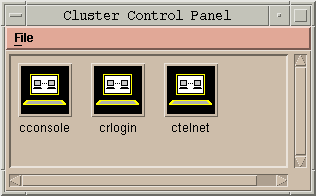1.4.1 How to Remotely Log In to Sun Cluster
The Cluster Control Panel (CCP) provides a launch pad for cconsole, crlogin, and ctelnet tools. All three tools start a multiple window connection to a set of specified nodes. The multiple-window connection consists of a host window for each of the specified nodes and a common window. Input directed into the common window is sent to each of these host windows, allowing you to run commands simultaneously on all nodes of the cluster. See the ccp(1M) and cconsole(1M) man pages for more information.
-
Verify that the following prerequisites are met before starting the CCP.
-
Install the appropriate Sun Cluster software (SUNWccon package) on the administrative console.
-
Make sure the PATH variable on the administrative console includes the Sun Cluster tools directory, /opt/SUNWcluster/bin, and /usr/cluster/bin. You can specify an alternate location for the tools directory by setting the $CLUSTER_HOME environment variable.
-
Configure the clusters file, the serialports file, and the nsswitch.conf file if using a terminal concentrator. These can be either /etc files or NIS/NIS+ databases. See clusters(4) and serialports(4) for more information.
-
-
Determine if you have a Sun Enterprise E10000 server platform.
-
If no, proceed to Step 3.
-
If yes, log into the System Service Processor (SSP) and connect by using the netcon command. Once connected, type Shift~@ to unlock the console and gain write access.
-
-
Start the CCP launch pad.
From the administrative console, type the following command.
# ccp clustername
The CCP launch pad is displayed.
-
To start a remote session with the cluster, click the appropriate icon (cconsole, crlogin, or ctelnet) in the CCP launch pad.
1.4.1.1 Example
The following example shows the Cluster Control Panel.
Figure 1-1 Cluster Control Panel

1.4.1.2 Where to Go From Here
You can also start cconsole, crlogin, or ctelnet sessions from the command line. See cconsole(1M) for more information.
- © 2010, Oracle Corporation and/or its affiliates
